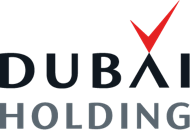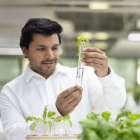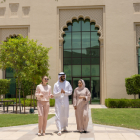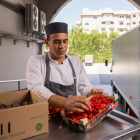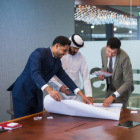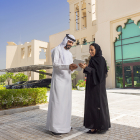At Dubai Holding, we are committed to improving our environmental impact across our operations. We actively reduce our use of energy and natural resources while conserving and restoring biodiversity.
We actively monitor our carbon emissions, as well as our energy consumption, water use and waste. Our efforts range from enhancing energy efficiency to conserving water, with an emphasis on reusing and recycling.
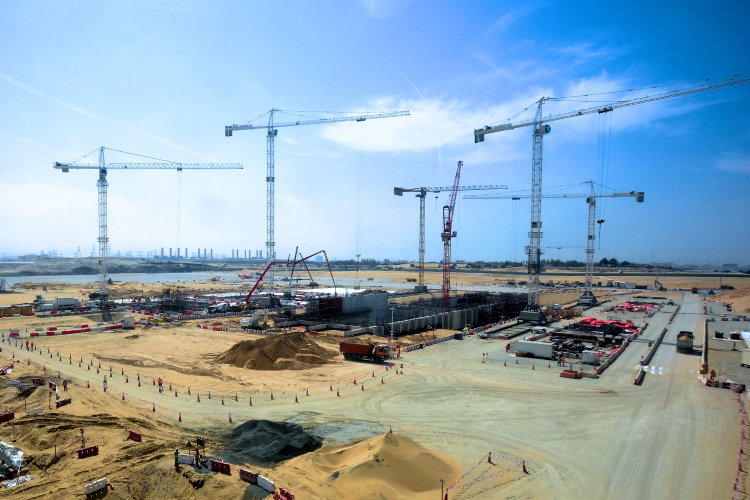
Warsan Waste Management Centre
Dubai Holding is a major investor in Warsan Waste Management Centre , the world’s largest Energy-from-Waste (EfW) facility, as part of a strategic partnership with Dubai Municipality. This is the flagship project of Dubai’s zero waste to landfill by 2030 commitment. Other partners include Dubal Holding, ITOCHU Corporation, Hitachi Zosen Inova, BESIX Group and Tech Group . Once complete, the facility will convert 1.9 million tonnes a year of municipal residual solid waste into sustainable energy for Dubai. The plant supports Dubai’s vision of becoming the world’s most sustainable city by diverting up to 45% of Dubai’s waste from landfill.
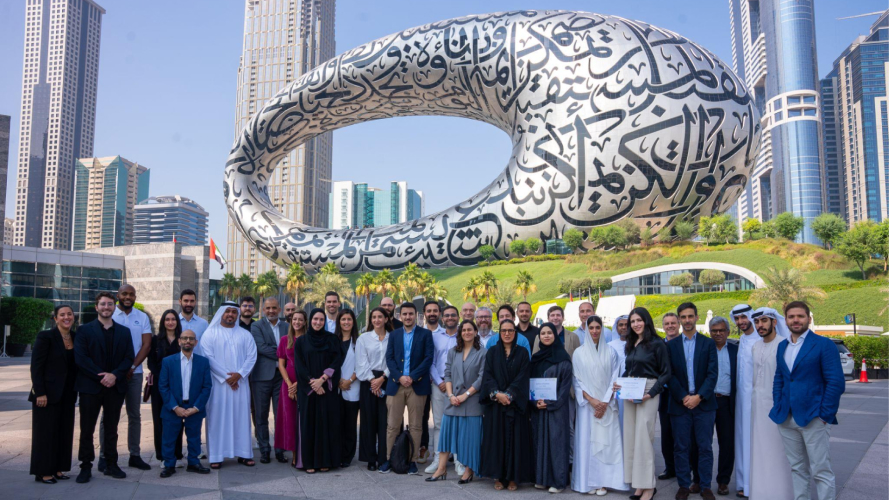
Llama Design Drive
Dubai Holding proudly participated in the inaugural Llama Design Drive, an AI accelerator powered by Meta in collaboration with Dubai Future Foundation and Startupbootcamp. This groundbreaking programme brought together startups and corporates across MENA to drive innovation using Meta’s open-source large language model, Llama 3.1, aligning with the UAE’s vision to be a global leader in AI technology.
As a key corporate participant alongside RTA, Emirates and Chalhoub Group, Dubai Holding developed two challenges to improve the accuracy and reliability of greenhouse gas (GHG) emissions reporting in line with its commitment to achieving Net Zero by 2050. 22 startups and eight AI professionals were selected from over 135 applicants, with six shortlisted to tackle Dubai Holding’s challenges.
CarbonSifr, a Dubai-based climate technology startup, emerged as the winner for both challenges, offering impactful solutions to simplify decarbonisation for businesses. Dubai Holding remains committed to fostering innovation and advancing AI and sustainability initiatives.
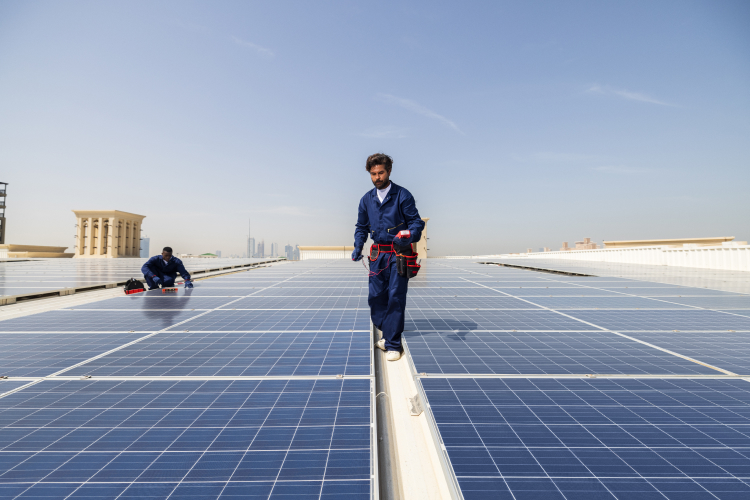
Solar Energy
Dubai’s abundant solar energy is being harnessed through solar panels on parking rooftops, generating clean electricity for buildings and vehicles. Solar powers our Dubai Holding Corporate office, Al Khawaneej Walk and Outlet Village. Energy projects at TECOM districts such as Dubai Outsource City and Dubai International Academic City, generated 12.35 GWh of solar energy, with more projects in the pipeline. Jumeirah and Dubai Holding Entertainment also plan to install solar panels on suitable properties.
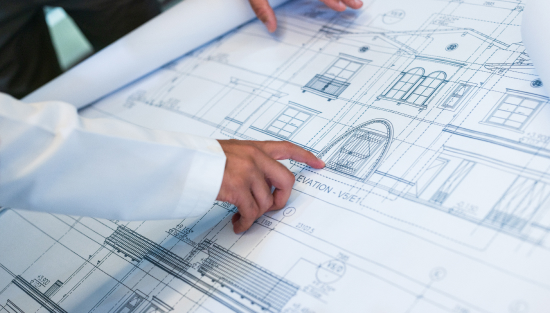
Retrofits and building management
Building management systems (BMS) and retrofits are reducing energy use across our portfolio. For example, at Madinat Jumeirah’s 40-hectare resort we retrofitted the ventilation system and used a cloud-based building management system to enable savings of more than 600,000 kwh of energy per year compared to 2008.

Sustainable Design
As a leading developer in Dubai, Dubai Holding is committed to durable, sustainable, and environmentally conscious development. We are building on existing good practice within the Group, such as TECOM’s two LEED Platinum, 22 Gold and six Silver certified buildings in Dubai, to ensure that our future builds meet the highest sustainability standards. To ensure a robust approach, we have developed Group-wide Sustainable Design Principles, which will be supported by specific technical requirements for different types of assets.
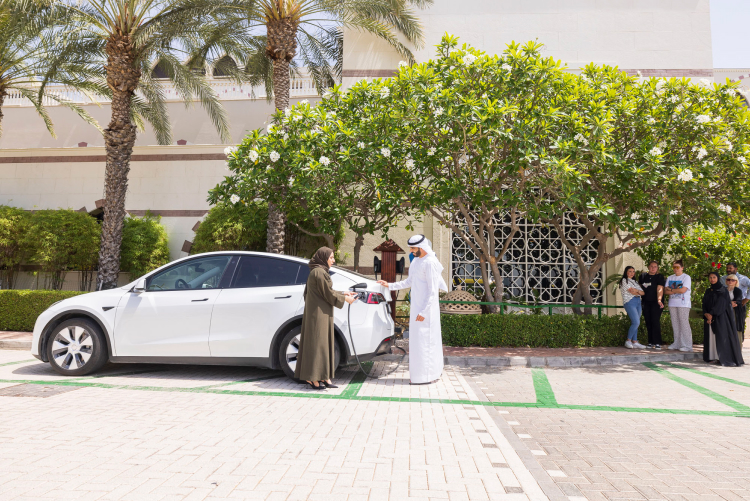
Green Mobility
We are working to improve access to sustainable travel options and reduce travel-related emissions across Dubai. Customers and the public now have access to 23 electric vehicle (EV) charging stations at Dubai Holding Asset Management and Dubai Community Management properties; 16 in our retail spaces and seven within residential communities. Guests can also charge their EVs across Jumeirah’s properties.
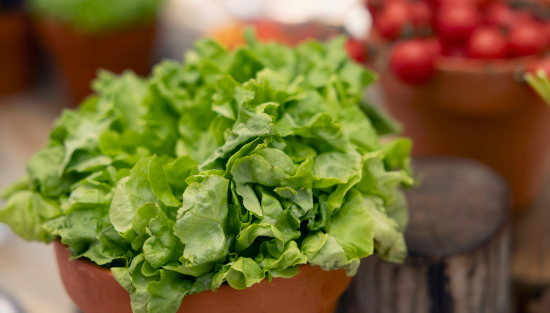
Turning Cooking Oil into Biofuels
Jumeirah Restaurants is transforming used cooking oil into biodiesel through a partnership with Lootah biofuels and using composting systems to turn our food waste into organic fertiliser. Similarly, Dubai Holding Entertainment is working with Neutral Fuel to pilot the collection of Used Cooking Oil (UCO) from its sites to be refined into biodiesel as an alternative to fossil fuel consumption in the UAE.
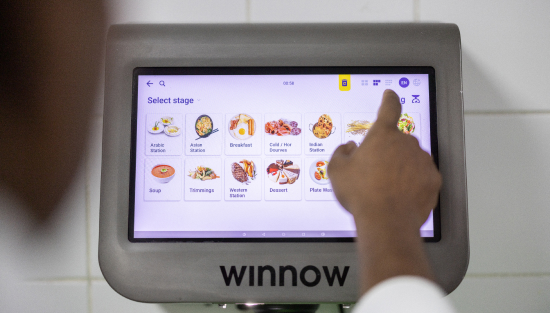
Reducing Food Waste through AI
Jumeirah Restaurants has installed the Winnow AI system to track and analyse food waste at four of its hotels, Jumeirah Zabeel Saray, Jumeirah Beach Hotel, Jumeirah Burj Al Arab and Jumeirah Al Qasr. This innovative system allows chefs to see where food is being wasted both in preparation in the kitchen and on the tables. The information gathered helps to inform procurement decisions, refine food preparation methods and design out waste in menu creation. The system has enabled Jumeirah Restaurants to not only reduce food waste but to bring down costs as well. At Jumeirah Restaurants in 2023, the system prevented 24,000 kg of food waste. This represents 98 tonnes of CO2 emissions and the equivalent of almost 57,000 meals.
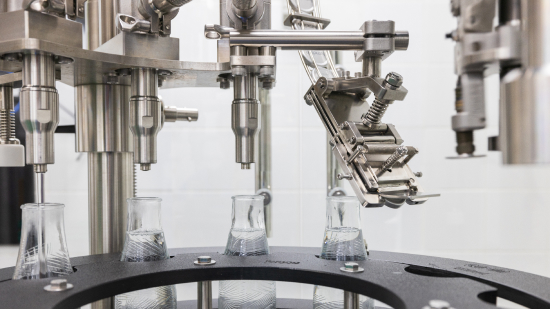
Going Plastic Free
As a signatory of the Global Tourism Plastics Initiative, Jumeirah is committed to becoming 100% free from single-use plastics by 2025. It has implemented a Nordaq in-house water bottling system at more than 70% of its UAE properties, eliminating nine million plastic water bottles each year. Jumeirah is also removing plastics from its food and beverage operations.
At Dubai Holding Entertainment, we have replaced 7,000 single-use plastic cutlery sets with bioplastics made from UAE palm tree waste at Roxy Cinema Dubai Hills and The Green Planet.
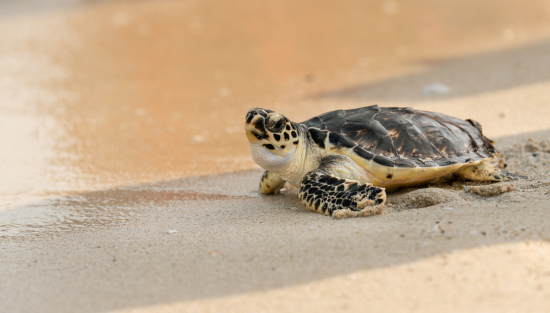
Dubai Turtle Rehabilitation Project (DTRP )
One of Dubai Holding’s most successful biodiversity programmes, the Dubai Turtle Rehabilitation Project rescues, rehabilitates and releases back into the wild any sea turtles found sick or injured in the region. To date, more than 2,100 turtles have been returned safely to the Arabian Gulf, with an average of more than 100 turtles rescued each year. Tourists can learn more about sea turtle conservation and participate in feeding at the sea-fed turtle lagoon at Jumeirah Al Naseem. The project also runs an educational programme for school groups. Between October 2022 and April 2023 , over 1,700 school children from the UAE participated in this programme.
